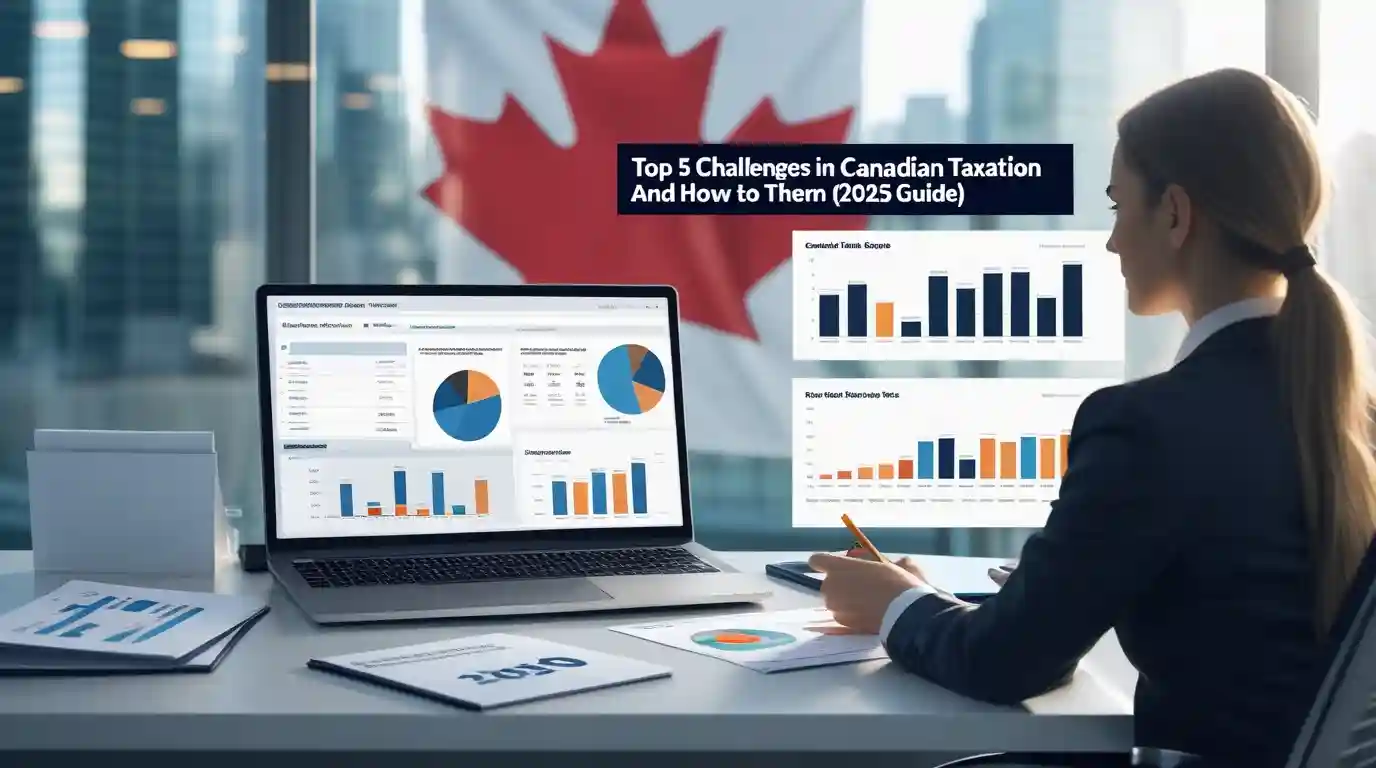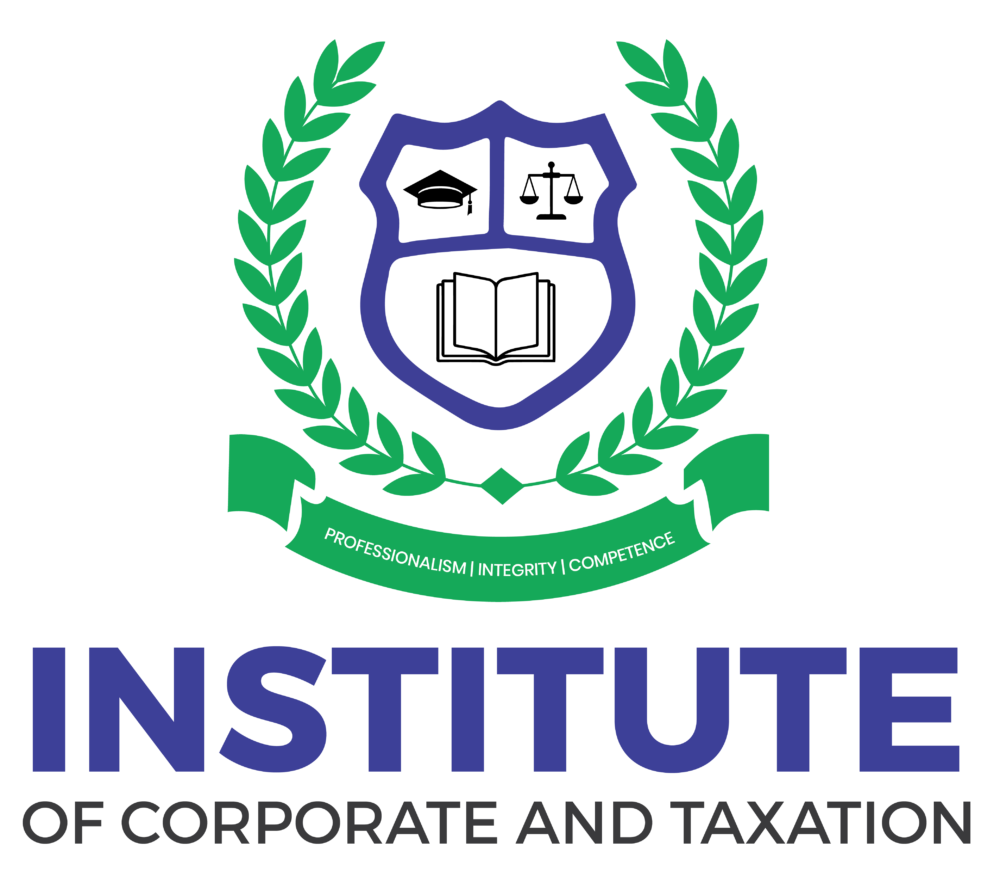
Top 5 Challenges in Canadian Taxation and How to Solve Them (2025 Guide)
Top 5 Challenges in Canadian Taxation and How to Solve Them (2025 Guide)
Filing taxes in Canada can feel overwhelming, especially when you’re juggling federal and provincial requirements, CRA regulations, and constantly changing tax laws. Whether you’re a small business owner, self-employed professional, or simply trying to maximize your deductions, understanding Canadian taxation is crucial for financial success.
This comprehensive guide breaks down the top five tax challenges Canadian taxpayers face in 2025 and provides practical solutions to help you navigate the Canada tax system with confidence. Let’s dive into the common pitfalls and how you can avoid them.
Understanding the Canadian Tax System: Why It’s Complex
The Canadian revenue system operates on multiple levels, combining federal and provincial taxes into one framework. Unlike many countries with a single tax authority, Canada requires taxpayers to comply with both the Canada Revenue Agency (CRA) at the federal level and individual provincial tax regulations.
This dual structure creates unique challenges for Canadian taxpayers. You’re not just calculating one tax rate—you’re working with Canadian tax brackets 2025 that vary depending on your province of residence. Add to this the various tax credits, deductions, and reporting obligations, and it’s easy to see why many people struggle with tax compliance in Canada.
Challenge #1: Navigating Complex Federal and Provincial Tax Rules
One of the biggest challenges is dealing with both federal and provincial taxes simultaneously. Each province has its own tax rates, credits, and filing requirements, which can be confusing if you’ve moved between provinces or work in multiple jurisdictions.
The Problem
Canadian taxpayers often struggle with understanding the complex tax structure. When you’re managing multi-province taxes, you need to determine which province’s rates apply, especially if you relocated during the tax year. The Canadian tax laws require you to pay tax based on your province of residence as of December 31st, but income earned in different provinces may have different implications.
The Solution
Start by determining your primary residence province. Use CRA My Account to track your address changes and ensure your records are current. Consider using Canadian tax software for small businesses or individuals that automatically calculates both federal and provincial obligations.
Practical Tips:
- Keep detailed records of any provincial moves throughout the year
- Understand that federal vs provincial tax comparison shows significant rate differences
- Consult the CRA website for province-specific tax credits you might be eligible for
- Consider professional tax advisory services if you have income from multiple provinces
For those looking to master these complexities professionally, specialized training can make a significant difference. Programs like the Canadian taxation course in Pakistan offered by institutes help international professionals understand the Canadian tax framework thoroughly.
Challenge #2: Claiming the Right Tax Deductions and Credits
Many individuals face difficulties in claiming the right tax deductions and credits. The Canadian tax system offers numerous opportunities to reduce your tax burden, but only if you know what to claim and have proper documentation.
The Problem
Canadian taxpayers leave money on the table every year by missing eligible deductions. From home office expenses for remote workers to medical expenses and charitable donations, the list of potential Canadian tax deductions is extensive but poorly understood.
The Solution
Educate yourself on available deductions before the income tax filing deadline Canada approaches. Common overlooked deductions include:
- Employment expenses: If you’re required to work from home, you may claim a portion of utilities, internet, and supplies
- Moving expenses: If you relocated for work or school, certain costs are deductible
- Medical expenses: These can include prescriptions, dental work, and even travel for medical care
- Childcare costs: Working parents can claim significant childcare expenses
- Investment carrying charges: Interest paid on money borrowed for investment purposes
Create a tax planning checklist at the beginning of each year. Use digital tax record systems to organize receipts and documentation throughout the year, not just during tax season. This approach to tax efficiency planning ensures you’re always prepared.
Pro Tip: The best tax planning strategies in Canada involve forward-thinking. Don’t wait until April to start organizing your tax documents.
Challenge #3: Self-Employment and Small Business Tax Compliance
Small business owners find CRA compliance and reporting overwhelming. The tax obligations for self-employed individuals and entrepreneurs differ significantly from those of traditional employees, creating confusion around GST/HST filing in Canada, quarterly installments, and allowable business expenses.
The Problem
Freelancers and digital workers face confusion around self-employment tax obligations. When you’re self-employed, you’re responsible for:
- Registering for a GST/HST number if revenue exceeds $30,000
- Making quarterly tax installments if you owe more than $3,000 in taxes
- Separating business and personal expenses
- Understanding what qualifies as a legitimate business deduction
- Maintaining proper accounting and bookkeeping Canada standards
The Solution
Implement a robust business tax filing Canada system from day one. Here’s how:
Set Up Proper Structure:
- Open a separate business bank account
- Choose appropriate accounting software
- Understand your GST/HST obligations early
- Register with CRA for business accounts
Track Everything:
- Keep detailed records of all business income and expenses
- Save receipts digitally using apps or cloud storage
- Document business mileage and vehicle expenses
- Maintain logs for home office usage
Understand Deductions: Small business tax Canada rules allow deductions for legitimate business expenses including:
- Office supplies and equipment
- Professional development and training
- Business insurance premiums
- Advertising and marketing costs
- Professional fees (accounting, legal)
- A portion of home expenses if you have a dedicated workspace
Understanding GST/HST filing requirements is essential for every registered business. You must file returns monthly, quarterly, or annually depending on your revenue level, and failure to do so results in penalties.
For aspiring tax professionals who want to specialize in helping businesses, enrolling in a Canadian taxation course in Islamabad or Canadian taxation course in Lahore through institutes like ICT provides structured learning on business taxation complexities.
Challenge #4: CRA Audits and Tax Compliance Issues
How CRA audits work remains a mystery to many taxpayers, creating unnecessary anxiety. The fear of an audit causes some people to either over-report income or avoid claiming legitimate deductions.
The Problem
Tax compliance issues in Canada can trigger a CRA review or full audit. Common red flags include:
- Significant year-over-year income fluctuations
- Unusually high deductions relative to income
- Cash-heavy businesses
- Unreported foreign income
- Late or incomplete tax filings
- Discrepancies between reported income and third-party information slips
The Solution
The best defense against a CRA audit is proper preparation and honest reporting. Here’s your corporate tax compliance checklist Canada:
Prevention Strategies:
- Accurate Record-Keeping: The tax record-keeping requirements mandate keeping all supporting documents for at least six years
- Report All Income: Even cash income must be reported accurately
- Reasonable Deductions: Only claim legitimate business expenses with proper documentation
- Timely Filing: Submit your tax return filing Canada by the deadline every year
- Professional Review: Have a tax professional review complex returns before submission
If You’re Audited:
- Respond promptly to all CRA communications
- Provide requested documents in an organized manner
- Consider hiring Canadian tax consultant services to represent you
- Understand your rights as a taxpayer
- Don’t panic—audits don’t automatically mean penalties
How to handle a CRA tax audit effectively requires calm cooperation and thorough documentation. Most audits are routine reviews, not criminal investigations.
Challenge #5: Late Filing Penalties and Missed Deadlines
Filing taxes late in Canada can result in hefty penalties and interest charges. Yet every year, thousands of Canadians miss the deadline due to procrastination, confusion, or simply not having their documentation ready.
The Problem
Late tax filing penalties in Canada are substantial:
- 5% penalty on unpaid taxes for late filing
- Additional 1% per month for up to 12 months
- Double penalties if you’ve been late before
- Daily compounding interest on unpaid amounts
Beyond financial penalties, late filing can affect your eligibility for benefits like the Canada Child Benefit, GST/HST credits, and other government programs.
The Solution
Avoid penalties with these proactive strategies:
Create a Timeline:
- Personal income tax Canada deadline: April 30, 2025
- Self-employed deadline: June 15, 2025 (but payment still due April 30)
- Corporate tax deadlines: Six months after fiscal year-end
Use Technology:
- Enable CRA email notifications
- Set calendar reminders starting in February
- Use online tax filing solutions for faster processing
- Consider CRA automation tools to streamline reporting
File Even If You Can’t Pay: If you can’t pay your full tax bill, file on time anyway. The late-filing penalty is separate from interest on unpaid taxes, and filing on time avoids the 5% immediate penalty.
Payment Arrangements: The CRA offers payment plans if you’re unable to pay in full. Contact them before the deadline to discuss options and potentially reduce interest charges.
Why Professional Tax Education Matters
Understanding CRA tax regulations and staying current with Canadian tax reform updates requires continuous learning. Whether you’re a taxpayer wanting to manage your own affairs or someone considering a career in taxation, proper education is invaluable.
Benefits of Professional Tax Training
Taxpayer education programs provide:
- In-depth understanding of Canadian income tax principles
- Practical skills in tax return filing Canada
- Knowledge of income reporting obligations
- Expertise in compliance risk management
- Career opportunities in accounting firms, corporations, and consultancy
For international professionals, pursuing a Canadian taxation course provides competitive advantages in the global job market. These specialized programs cover everything from basic tax filing in Canada to advanced corporate tax in Canada strategies.
Career Opportunities in Canadian Taxation
The demand for tax professionals continues to grow. Career paths include:
- Tax accountant or consultant
- CRA officer
- Corporate tax specialist
- International tax advisor
- Financial planner with tax specialization
Professionals with expertise in Canadian tax laws are sought after by multinational corporations, accounting firms, and businesses operating across borders, particularly for handling cross-border tax issues and double taxation for Canadians abroad.

Why Choose ICT – Institute of Corporate and Taxation Islamabad
If you’re serious about mastering Canadian taxation, structured education makes all the difference. The Institute of Corporate and Taxation offers comprehensive programs designed for both beginners and advanced professionals.
What Makes ICT Stand Out:
- Expert instructors with real-world Canadian tax experience
- Curriculum covering federal and provincial tax systems
- Practical case studies and scenarios
- Flexible learning options for working professionals
- Canadian taxation course in Karachi, Islamabad, and Lahore locations
- Focus on current CRA regulations and 2025 tax updates
Whether you’re looking to handle your own business taxes more effectively or pursue a career in taxation, ICT provides the knowledge and skills you need.
Practical Tools and Resources for Canadian Taxpayers
Success in managing Canadian taxation requires the right tools and resources:
Software Solutions:
- TurboTax, UFile, or SimpleTax for personal returns
- QuickBooks or FreshBooks for small business accounting
- Specialized corporate tax software for larger businesses
Official Resources:
- CRA website (canada.ca/taxes)
- CRA My Account for personal tax management
- CRA Business Account for business tax administration
- Tax-free savings account (TFSA) and RRSP calculators
Professional Support:
- Certified Professional Accountants (CPA)
- Tax lawyers for complex situations
- Enrolled agents authorized to represent taxpayers before CRA
These sustainable tax planning tools help maintain organized financial records year-round, not just during tax season.
Real-World Success Stories
Understanding how to file taxes correctly in Canada transforms financial outcomes. Consider these examples:
Small Business Owner: Sarah, a freelance graphic designer in Toronto, was overwhelmed by self-employed income tax mistakes to avoid. After taking professional tax training, she properly structured her business, implemented quarterly installments, and claimed legitimate home office deductions—saving over $8,000 annually.
New Immigrant: Ahmed moved to Canada in 2024 and struggled with how to file my first tax return in Canada. By learning about available newcomer tax credits and proper income reporting, he maximized his refund and established a solid foundation for future filings.
Corporate Professional: A small tech startup in Vancouver faced audit concerns due to rapid growth. By implementing proper accounting and bookkeeping Canada practices and working with a tax consultant, they passed their CRA review smoothly and established compliant systems for scaling.
Future of Canadian Taxation
The Canadian tax landscape continues evolving with technology and policy changes:
- Increased digital reporting requirements
- Enhanced CRA automation and data matching
- Expanded online tax filing solutions
- New credits and deductions for green initiatives
- Stricter enforcement of foreign income reporting
Staying informed about these changes through financial literacy in Canada programs ensures you remain compliant and optimize your tax position.
Frequently Asked Questions
What are the main tax challenges in Canada? The primary challenges include navigating both federal and provincial tax systems, claiming appropriate deductions and credits, managing self-employment tax obligations, preparing for potential CRA audits, and meeting filing deadlines to avoid penalties. Each challenge requires specific knowledge of Canadian tax laws and proper documentation.
How can I reduce my taxes legally in Canada? Maximize RRSP contributions, claim all eligible deductions (medical, charitable, employment expenses), utilize TFSA accounts, split income with family members where permitted, time capital gains strategically, and claim appropriate tax credits. Professional tax planning helps identify opportunities specific to your situation.
How do small businesses handle taxes in Canada? Small businesses must register for GST/HST if revenue exceeds $30,000, make quarterly tax installments if owing more than $3,000, maintain separate business accounts, track all income and expenses meticulously, and file both personal and business tax returns. Using proper accounting software and professional guidance simplifies compliance.
What is CRA and how does it work? The Canada Revenue Agency (CRA) is the federal body responsible for administering tax laws, collecting taxes, and distributing benefit payments. It processes tax returns, conducts audits, enforces tax compliance, and manages programs like GST/HST credits and Canada Child Benefit. Taxpayers interact with CRA through online accounts, phone service, or in-person offices.
What happens if I file taxes late in Canada? Late filing results in a 5% penalty on unpaid taxes plus 1% per month for up to 12 months. Repeat offenders face double penalties. Additionally, you’ll pay daily compounding interest on unpaid amounts. Late filing can also delay or reduce government benefit payments you’re entitled to receive.
How to claim GST/HST refunds? Businesses registered for GST/HST file regular returns (monthly, quarterly, or annually) where they report collected GST/HST and claim input tax credits for GST/HST paid on business expenses. When input credits exceed collected GST/HST, you receive a refund. Individuals may claim GST/HST credits through their annual tax return based on income level.
Conclusion: Take Control of Your Canadian Tax Obligations
Mastering Canadian taxation doesn’t have to be intimidating. By understanding these five common challenges and implementing the solutions outlined, you’ll navigate tax season with confidence, maximize your deductions, and ensure full compliance with CRA tax regulations.
Remember that tax compliance issues in Canada are often preventable with proper planning, education, and record-keeping. Whether you’re managing personal income tax Canada obligations or running a business, the key is staying informed and proactive.
Ready to become a Canadian taxation expert? The knowledge you gain will pay dividends throughout your career and personal financial life.
Take the next step: Book a seat at Advanced Taxation courses offered by ICT – Institute of Corporate and Taxation Islamabad. With comprehensive programs covering everything from basic tax filing to complex corporate structures, ICT equips you with the skills employers value and the knowledge you need for tax efficiency planning.
Don’t let tax confusion hold you back. Explore Advanced Taxation Courses at ICT and transform your understanding of the Canadian tax system today.
This guide provides general information about Canadian taxation. For advice specific to your situation, consult a qualified tax professional or CPA.




